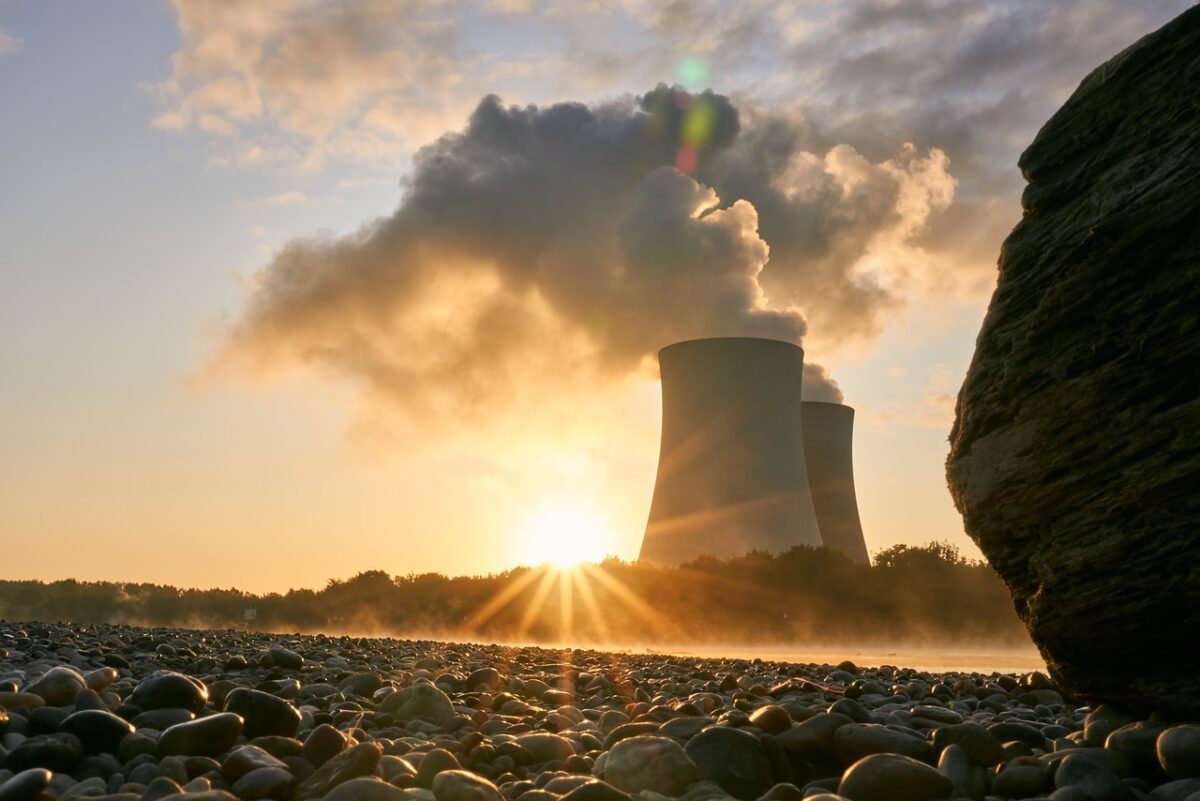- cross-posted to:
- technology@lemmy.world
The question has always been what does one do when the renewables aren’t providing enough power (ex: nights, etc). The current solution is natural gas. It would be a big improvement if we would use a carbon-free source like nuclear instead.
Pumped-storage hydroelectricity is an old and proven method for load balancing intermittent power sources. Would like to see more of that as geography permits.
The “as geography permits” part is a big obstacle, unfortunately.
Actually it isn’t if you stop only looking at places that are also suitable as power plant, that is, have a big river flowing through them.
You can do pumped hydro in an old mineshaft.
Can you? To store the energy you need to pump up; to use it you need to flow back down. Where is the ‘down’ or ‘up’ from a mine shaft?
I’d also question if the volume would be worth it.
Edit: maybe you are thinking compressed air?
…the up is at the surface and the down is at the bottom of the mine shaft? I’m not talking about horizontal ones, of course. You let water in, generating power, and then, to regenerate empty space and with that the capacity to again generate power, you spend energy to pump it up.
As to volume, there’s some gigantic mineshafts, but even small ones might warrant small installations it’s not like some pipes and a pump and generator are much of an investment. Of course, don’t try that in a salt mine geology will play an important part.
And lastly: Mineshafts aren’t the only option. There’s a lot of mountains, and they have many sides, and also plateaus and valleys. Build two concrete basins, connect them via pipe, ship in water from somewhere, voila, pumped hydro storage.
Not in China.
It’s an obstacle for anything, including nuclear. Just ask Japan.
That will not remotely cover baseline loads and is not without significant efficiency loss due to the pumping phase.
All commonly used forms of energy storage have some efficiency loss. Pumped storage is not perfect but my understanding is that it usually comes at a 10-25% loss, which isn’t all that shabby all things considered.
According to the article, the researchers concluded that nuclear reactors are not a good fit for that role.
The growing idea is to just have a shit load of renewables, everywhere. The wind is always blowing somewhere, and the sun shines through the clouds. If you have a ridiculous excess total capacity then even when you’re running at limited capacity you could still cover the demand. Basically, most of our renewable infrastructure would actually be curtailed or offline a lot of the time.
And that opens up opportunities for energy intensive industries like aluminium or hydrogen production to run whilst there’s an excess of energy
I’m all for green hydrogen production, it’s using hydrogen in place of fossil fuels that bothers me. We already have a shit load of demand for hydrogen from industrial uses, and it would take 3x the world’s total renewable capacity in 2019, dedicated solely to hydrogen production, to meet this with green hydrogen. If we start adding transportation into that demand we’ll never make it, and it will be far less efficient than other energy sources (eg batteries).
So yeah, we should have green hydrogen production, but we shouldn’t listen to those same people when they say they think it should also be used for transportation. That’s just trying to increase the size of the market to increase profits.
Hydrogen works well with a renewable grids because you can take advantage of the times there is excess energy production so that power doesn’t just go to waste.
We do need to be careful because hydrogen is often sold as a pipe dream by gas companies to convince us to use gas (e.g. “this new gas turbine power plant can be converted to hydrogen”, even though that’d be a workload less efficient than fuel cells).
As for its use in transport, it looks like battery electric vehicles have won that battle for personal vehicles. Both have their advantages but in practice there are few enough fuel stations for hydrogen and enough chargers that that’s not going to flip.
However, batteries are entirely unsuitable to long distance, high load transport like trucks. Ideally they’d be replaced by rail, but that’s not happening anytime soon in many places so hydrogen likely will be the solution there.
consumers may also help reduce system costs by adapting their electricity consumption to the availability of renewable energy
From the linked paper. They mention some other options for storage like batteries (plenty of environmental issues there though) but based on the quoted text I have a hard time taking this seriously if they actually expect people to change their behavior.
Plug in car. Press the “I would like to only pay $100/yr to fuel this please” button.
Later when you leave for work press the “I would like the house to be cool when I get home and also want to pay half as much for AC” button.
Buy the 1.5m wide water heater that stores 10kWh of hot water and lasts a week between heatings rather than the 70cm one that lasts a day.
Such an unconscionable burden.
I think innovation at the consumption end is going to help a lot. On Technology Connections I saw an electric induction stove that could be powered from a regular socket. It had a battery that would trickle charge throughout the day and then use the batteries to power the induction cooktops, as well as a couple of plugs. If widely deployed and in other appliances, with a little smarts that could provide power leveling at the home level.
Another solution would be adding some intelligence to water heaters. Have a temperature control valve on the output where you set the temperature, and program the water heater get to 160-180°F when electricity is cheap. This would be a thermal battery that would easily level out demand for electricity for heating water.
Or you could do thermal storage by heating a house very warm/cold prior to a large cold snap/heat wave, and letting it coast down/up to a temperature instead of heating/cooling a lot during the cold/hot weather. He’s got a video on this technique here
“Not enough power from renewables? Just turn off your fridge for a few days and you’ll be fine!”
Honestly that sentiment has strong “blame the consumer” vibes that seems to pervade climate arguments.
Sure, people can reduce consumption, but at best its a stopgap, not a solution.
There’s stuff like heaters and to a degree things like washing machines that can shape the time they’re active to whenever there’s a lull.
Consider Britain: Each time the BBC runs a popular show you get an energy usage spike once it’s over because people are getting up and make themselves a cuppa. Doesn’t really make sense to run the heater in the tank for your shower at the same time, or charge your car, that can wait a bit.
Here’s an example of what can be done with 5 hours of storage. 5 hours is a 25% participation rate of V2G where the participants offer a third of their battery capacity.
If going with the (false) assumption that nuclear can hit 100% grid penetration, it would take decades to offset the carbon released by causing a single year of delay.
The lowest carbon “let’s pretend storage is impossible and go with 100% nuclear” would still start with exclusively funding VRE.
Lol at trying to pass that link off as a valid, unbiased source.
lol at a rando discrediting an article that gives supporting data. Did you even read it? Write your own well supported opinion and submit it here. We’ll wait.
Oh is that a new rule? You can’t point out garbage, bias sources unless you’ve written a dissertation on it? Fucking rube.
Good point. You are a garbage biased source.
Great comeback. Very cute.
But why don’t you go ahead and go get a juice box and let the adults speak.
TIL an “adult” is someone who denigrates a link without even reading it or having any substantive data points to support their points. Sounds like you have plenty of juice boxes to give out.
Nuclear is a terrible fit for peaker plants, that’s not how it works. If it isn’t selling energy at as close to 100% of the time as is feasible it’s losing money.
deleted by creator
What makes you think personal renewable are going to be more efficient than large scale renewables? The sun doesn’t magically shine in the middle of the night on personal homes, the wind doesn’t magically blow only in residential areas…
While I agree completely, it is troublesome that you, BombOmOm, are saying this… :/ username checks no fly list out.
Nuclear is not, and cannot be, a gap coverage solution. Due to xenon/iodine poisoning and decay heat management you need to keep a reactor critical as long as possible to be economical. That’s independent of the problem of keeping the water hot that fossil fuel generators share. You can’t just turn a reactor on and off.
It can provide a baseload though where solar can provide extra power during the heat for places where the summer and days are the power intensive part, rather than winter and nights. You still need a short-term stop gap as the sun sets but it’s still hot out, but even if that was just powered by NG it would be a huge step forward. Adding greener energy storage options to store extra power nuclear or wind could generate overnight would be better.
Btw, could a small percent of nuclear reactors be turned on/off seasonally, potentially transporting fuel between the north in the winter and the south in the summer?
Yes, but if you spend the money making a reactor, you really should just use it. Uranium is pretty cheap, it’s the reactor that’s expensive.
Fair. If a grid was just powered by batteries, solar, wind, and existing nuclear plants, which would be the most effective to turn off when demand is too low?
Keep the reactors running to avoid that issue. As long as they are providing enough power when the renewables aren’t, we successfully cut out natural gas from the power grid.
Columbia station load follows within a certain range set by nearby hydro. It can be done. The economics aren’t even that bad, as fuel is one of the cheaper inputs to the reactor.
The best solution is having EVs plugged into the grid at night. VTG is the easy solution to peaker needs.
Then you are getting into the issue of the power company eating up your charge cycles on your EV battery. Who pays for the fact that my battery now has half the design lifetime due to constant cycling because it’s feeding the grid?
These are easily solved details. For example, by providing power on the grid you are in essence a power company. Perhaps you get reimbursed based upon what you provide. You know net metering is already a thing, right?
I’m just saying that we might need to get away from the idea that a car battery is solely an owner expense. They’d have to be subsidized or there would be huge equity issues. And yes “I do know about net metering,right.”
Yes you are correct in stating that if you used your car battery for grid usage you would need to get reimbursed for that. And I gave you an easy solution. This could actually be a profit center for EV owners and if you have your car plugged into the grid at peak times, you would get reimbursed more per kWh (ie TOU) with the net metering. Win/win for everybody except utilities and fossil fuel providers.
The renewables-only crowd is just ignorant about this simple fact.
The future of energy will be dominated by solar and nuclear power. With hydro, geothermal and wind playing supporting roles, depending on geography.
The only question is, how much fossil fuels do we burn until then?
Those who oppose nuclear are really just in favour of burning fossil fuels in the interim. But the inevitable switch to nuclear will come as fossil fuels are depleted.
Nature has given us the atom as the most dense and durable way to store energy. That will never change.
Typical energy density of ore in a new uranium mine burned in an LWR is about the same of coal.
All of the economic/not too damaging stuff together would power the world for about 3 years.
at night perhaps they could sleep
That’s not difficult. Nuclear is extremely expensive.
With renewables you just sell it to the grid for whatever gas generated electricity is going for. Which is currently still a fucking lot. Thanks Russia.
Removed by mod
Thanks Russia.
Oh, it gets worse. Russia is big on nuclear, they have a whole agency that deals in nuclear in Europe, it’s called ROSATOM.
This is related to other post with the fossil-fuel sponsored ecomodernist girl whining about Greenpeace and nuclear:
Russia lobbied to have the EU include nuclear energy and fossil methane to be included in the “sustainable” taxonomy: https://www.greenpeace.de/publikationen/20220517-greenpeace-report-russland-taxonomie.pdf (PDF)
Russia has a good stranglehold on nuclear energy: https://www.bloomberg.com/news/features/2023-02-14/russia-s-grip-on-nuclear-power-trade-is-only-getting-stronger and many European powers …compliant to that.
Russia’s nuclear trade with Europe flowing amid Ukraine war https://web.archive.org/web/20221011224411/https://abcnews.go.com/International/wireStory/russias-nuclear-trade-europe-flowing-amid-ukraine-war-90691865
European Union nations are continuing to import and export nuclear fuel that is not under EU sanctions on Russia
Russia’s Grip on Nuclear-Power Trade Is Only Getting Stronger https://www.politico.eu/article/russia-nuclear-power-uranium-plants-europe-imports-germany-sanctions-ukraine-war/
New data show exports in the strategic industry jumped more than 20% last year, as long-term projects boost Russian influence.
Here’s an article in German: https://www.spiegel.de/wirtschaft/unternehmen/uran-abhaengigkeit-russland-koennte-den-usa-noch-erhebliche-schmerzen-zufuegen-a-cad81a53-4704-4842-a641-1b6191e4add5
It’s even more complicated, but building nuclear now in Europe would mean more dependency on Russian nuclear fuel and nuclear tech.
This includes France, the nuclear postergirl:
French Nuclear Power Crisis Frustrates Europe’s Push to Quit Russian Energy https://www.nytimes.com/2022/06/18/business/france-nuclear-power-russia.html
France typically exports electricity, but now it risks blackouts and a need for imported power because of problems at the state nuclear operator.
France accused of funding Putin’s war effort by buying his nuclear fuel https://www.telegraph.co.uk/world-news/2022/12/02/france-accused-aiding-putins-war-importing-russian-nuclear-fuel/
It’s not just complicated, with many limits, but the useless yammer of nuclear-fanboys is just using up air in discourse.
Building more nuclear will not help with with climate warming mitigation. And it has its own problems with climate, as France knows…
(most recent time this happened, again) France to reduce nuclear power generation due to heat wave https://www.laprensalatina.com/france-to-reduce-nuclear-power-generation-due-to-heat-wave/ from a few weeks ago.
Building More nuclear will help with climate warming. None of your links deal with that.
how will it help? the stuff comes online in decades in the future. We need to reduce emissions now.
I agree we need help now. There’s a reason it comes so far in the future and all of them are artificial.
If we really wanted to we could build safe nuclear tomorrow. Okay that’s a bit of an exaggeration but you know what I mean.
Stop all the hate for nuclear. It’s just a way for the fossil fuel industry to cause infighting among those of us who care about the climate. If we can make energy free or close to it, we should. The closer everything comes to being free the better.
People pushing nuclear is a way for fossil fuels industry to keep us reliant on them for the next 20 years while we build power plants.
More than that as we will need to pay them to maintain storage which they won’t be keen to do without tons of government and tax payer assistance
Nah, the power company likes the profits from nuclear way better.
The secret is that they can bill the ratepayers for all the cost overruns, while keeping the extra profits on the cost-plus construction contract for the shareholders.
(Source: I’m a Georgia Power ratepayer being absolutely reamed for Plant Vogtle 3 and 4, and the Georgia Public Service Commission isn’t doing a single goddamned thing to hold Georgia Power to account or to help people like me.)
Yeah, but think of the poor corporations.
K, but this isn’t about profits. This is about not destroying the environment, which nuclear can help with (you know if nobody bombs the plant)
But it’s also about cost. Nuclear is far more expensive upfront, more expensive to maintain, and more expensive to decommission. Cheap, agile renewables will be an easier option for the vast majority of the planet
We would be really stupid to worry about money when trying to save the planet. But, what did I know, I’m just some guy on the internet
Financiers tend to worry about money, yes.
First option: a wind/solar plant with costs that aren’t going to increase substantially, power being sold within a couple of years therefore repayments will begin quickly.
Second option: a nuclear proposal - massive costs upfront, that will inevitably skyrocket while the completion date slips and slips, and power being sold 10-15 year in the future so repayments are a long way off.
It’s not a difficult choice.
If your argument is that we should nationalize the energy sector so government can get involved more directly to mitigate financing issues, sure. We both know that’s not going to happen.
How does one provide power when the renewables don’t provide enough power (nights, etc)? Our current solution is natural gas. Nuclear is a huge step up as a carbon-free provider.
Storage, there are many options. Pumped hydro is great for places with elevation change, molten salt is great for desert climates. Batteries, green hydrogen, compressed gas, etc.
We’ve been storing energy for thousands of years. It’s not difficult in the way nuclear fusion, SMRs, or thorium are difficult.
We’re also moving towards EVs. I’d like to see investment in using a fleet of connected EVs as a giant battery. Your energy company can pay you for making 10-15% of your EV battery available for grid storage and you can opt out if you need that extra range for a trip.
The article talks about the coming droughts and water shortages. Pumped hydro is nice, if you have water.
There’s evaporation, which can be mitigated by floating solar panels, but pumped hydro is a closed system, it doesn’t consume water.
The largest battery on the planet would power my workplace for less than two hours- if it could meet the instant demand, which it cannot.
I’m all for energy storage, but I realise there’s a lot of work to do.
1,200MW isn’t enough? Where do you work?
Why do you think batteries can’t meet instant demand? That’s kind of their whole thing.
Everything is about profits. Otherwise we wouldn’t even be in this mess.
Ah, yes, love my last vacations in chernobyl
Until we are able to sort out the cost/tech to make a green-sourced grid (such that the role of utilities is to capture surpluses from when the sun shines and the wind blows and sell it back when transient sources aren’t producing) nuclear is going to be an important part of a non-carbon-producing energy portfolio.
Already it’s cheaper to bring new solar and wind online than any other sort of electrical production; the fact that those are transient supply sources is the last major obstacle to phasing carbon fuels entirely out of the grid. If nuclear can be brought safely online it could mean pushing the use of fossil energy entirely into use cases where energy density is critical (like military aviation)
deleted by creator
Helium is the only element in the periodic table that is non renewable.
deleted by creator
There was a strategic helium reserve that the US government operated, but it was defunded and drawn down to depletion because of capitalism (gov’t doing it means corpos can’t make $$$ doing the same thing for twelve times the price).
The National Helium Reserve was started in the 1920s to store helium for military airships and barrage balloons; but airplane technology got a lot better and so we don’t use airships or even many balloons for military purposes anymore. So the original purpose of the reserve never turned out to be all that useful.
Helium is found alongside natural gas, and there is still plenty of helium production in the US. Until we get a real room-temperature superconductor, every MRI machine consumes liquid helium for cooling. This and other industrial uses make it profitable for natural gas producers to keep extracting helium.
America had huge reserves but released majority of it decades ago
The last helium from the National Helium Reserve is being auctioned off this November along with helium enrichment equipment, pipelines, and some office buildings too. Get your bid in!
Sir I would like one helium please
Different isotypes the one you buy for baloons is not the same type thags used in nuclear reactors
That sounds like “pie in the sky”:
The problem with fusion reactors is exactly the containment of the plasma and avoiding that it dissipates its heat through light emission.
If that was solved we would be better off doing fusion with plasma rather than fission, since even deuterium (a heavier form of hydrogen atoms because it has 1 neutron in the nucleous) can simply be extracted from the water and the H+H fusion reaction releases more energy than any fission reactions (and, funilly enough, would produce the much rarer helium, that’s needed for those reactors of yours).
The problem with fusion reactors is exactly the containment of the plasma and avoiding that it dissipates its heat through light emission.
That’s one problem. Neutron embrittlement is another.
Yeah, I was just addressing the previous post.
In all fairness I only checked what’s going on with fusion once in a while as my background is Physics (as in, I started a degree in it and then ended up going to EE because in my home country there really only are jobs for theoretical physicists, not the more hands-on kind) and hence only know it at a superficial level (of somebody with the background to understand Particle Physics but not a domain expert).
Yeah, I do know about the embrittlement of the container walls due to neutron emission from the fusion reaction (no idea how bad or not that is compared to the rest), but last I checked plasma containment was still a bit of a problem as was the plasma cooling through photon emission (mind you, that might not be as much of a problem for the kind of temperature of the plasma the previous poster was mentioning, which - I assume - are less that what’s need to induce fusion).
That said, all in all it just sounds strange to use fission to generate a plasma - I mean, bloody fire generates a plasma (the flame is a plasma) - so I don’t quite see the point of generating plasma with the whole overhead of a nuclear reaction rather than, say, high powered lasers, high-voltage currents (yeah, lighting is plasma) or just plain old chemical reactions.
That whole thing sounded a bit too much like “fancy sciency words thrown around to deceive the ignorant” so common in scams.
If we measured the amount of destruction to our environment that fossil fuels cost long-term I bet they’d stop being profitable really quick.
Oil companies knew all about this since at least the 70s, and it was still very very profitable for them.
Turns out humans are selfish.
Who fucking cares about profit, our planet is dying.
anyone with a basic understanding of economics?
Like either we spend fuck tons of money subsidising nuclear to make it profitable or we can focus on wind and companies will build it themselves because its profitable.
What do you think is more likely: that I don’t understand the basics of how capitalism works? Or maybe that the comment was a criticism of the worship of the “free market,” and considering profit-motive to be the be-all, end-all?
Well considering you’re conflating a market economy with capitalism…
I care. I care that we don’t make a rash decision for a potential short term solution. Why not ramp up solar / wind and other alternatives?
Storage, we have less Lithium than you seem to think, and pumped hydro is not a solution – not that it’s not a universal solution, it’s simply not a solution. Implementation costs more than a nuclear reactor and maintenance and security costs are way, way higher than a nuclear reactor. We, unless you want to adopt a powerless overnight lifestyle, need on-demand power generation. Nuclear is the best, safest, cleanest, most feasible option for that until we remove all precious metals from energy storage technology.
I disagree. Nuclear is too slow costly and a huge security risk for an already unsafe grid. We need energy decentralization in addition to decarbonization. Renewables like solar and wind are 100% the best step.
The planet is fine, and will be fine after we’ve gone, much like it was fine after the other mass extinctions. What’s dying is the environment that supports human life. Less snappy, granted, but I feel like emphasising that this is our problem and not something we should do for others might be worthwhile.
Do you never get tired of being pointlessly pedantic? Yes, the planet, as in the big rock floating in space, will continue to exist. Thanks.
There’s a point to my pedantry here. Did you read my whole post or just the first few words?
More profitable AND safer. Humans are too stupid, lazy and bureaucratic to use nuclear.
Not actually safer, per kilowatt hour though.
To be fair though per terrawatt hour nuclear is safer than wind power and only beat in safety by solar.
This is such a weird thing to research because a government (or governments) can directly or almost directly control what is profitable in a society based upon what is needed.
not really, while the government can do stuff like incentivize this only shifts the cost somewhere else
Check out the farm bill, or ethanol in gasoline, or various other things. They also can disincentivize things, outright ban things, and add untold cost to competing stuff in order to make yours more profitable than theirs.
The research done here had to be within the existing regulatory environment, which is not a fixed constraint at all but rather a product of government and industry actors.
And all of that is just talking about more indirect controls commonly applied in neoliberal leaning countries, some countries directly control how much things cost and how much overhead there is.
deleted by creator
Government can just take over and control whatever it wants. With no business allowed to operate the cost and therefore profit don’t matter
What about when the grid is almost entirely renewables? Is nuclear cheaper than just storage? What about storage one it’s already been implemented to the point of resource scarcity?
No, nuclear is always more expensive in real world conditions. Places with mostly renewables plus in-fill from batteries and transient gas generation are a lot cheaper than nuclear. eg. South Australia.
But transient has generation produces much more ghgs than nuclear, and when accounting for the ghg potential of metanen and normal pipeline leakage, it is even more damaging than coal.
It’s required less and less as other forms of generation are added to the mix. eg. Tidal and pumped hydro.
1kg of lithium produces about 10kWh of storage for 15-20 years. 3-12 hours of storage is plenty for a >95% VRE grid.
1kg of uranium produces about 750W for 6 years.
There are about 20 million tonnes of conventional lithium economically accessible reserves (and it has only been of economic interest for a short time).
There are about 10 million tonnes of reasonably assured accessible uranium (not reserves, stuff assumed to exist). It has had many boom/bust cycles of prospecting.
Lithium batteries are not even being proposed as the main grid storage method.
Cobalt is the difficult one, especially with the child workers mining it.
Profitability is so much not the point here and also, there’s no reason for different energy production sources (especially ones that are base power vs incidental power) to be in conflict. Do both of them.
There is, actually, a conflict. Renewables are more dynamic in production. You can turn them on and off quickly, you can scale them quickly too. You can’t do that with nuclear plants. Baseload is not a goal, it’s a limit. That’s why the nuclear energy sector is friends with the coal sector.
Example of Nuclear-Coal friendship from Poland: https://twitter.com/stepien_przemek/status/1642908210913853442
Example of Nuclear-Coal friendship from the USA: https://www.energyandpolicy.org/generation-now-inc/
A deeper understanding here: “The duck in the room - the end of baseload” https://jeromeaparis.substack.com/p/the-duck-in-the-room-the-end-of-baseload
Baseload is not a goal, it’s a limit.
I would love to know what oil company you heard that from, since it’s absolutely not true. You can both turn them off quickly (faster, in fact, than LNG or Coal), start them up quickly (sub minutes) and change production quickly. These have all been features since 1960’s era reactors, and we’re around 10 generations past them.
I think they might be referring to turning down the reactors, which I think is an actual difficulty with them. By no means however is it a reason to not use them, it just means you employ it wisely. Have it meet most of the demand, and use solar and wind and others to supplement to full demand.
I wonder how this determination is affected by the boondoggle that is the public funding of nuke plant construction with huge overruns paid for by consumers.
It’s getting close to the point where even if you are handed one it’s more cost effective to build a wind farm and let it sit.
A MWh of wind is about $33 and O&M for a MWh of nuclear is about $30.
Its a relatively recent development however since the panels and turbines got quite a bit cheaper. Nowadays solar/wind ends up fairly similar and Nuclear is about 3x the price (with gas being more and coal being nearly 7x more). That is only some of the story as you need some storage as well but it doesn’t end up in favour of Nuclear. 15 years ago Nuclear was a clear win, its just not anymore the price of Solar come down fast.



















